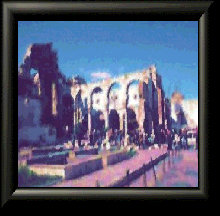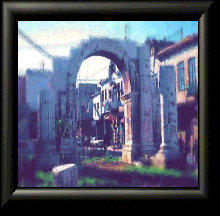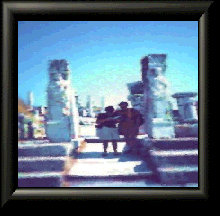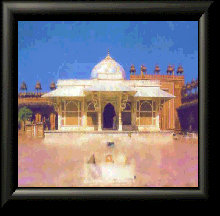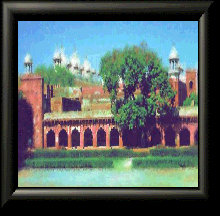
(p13) The Chapter
3 New Nippurland 3
Ravana got impatient "If the national power is damaged, I cannot
be revenged on him."
He turned around and aimed at militarism.
He decided to carry out military power ascendancy of the circumference
countries.
The prime unit of a New Nippurland was a mercenary-soldier unit
of a Dravidan subject.
Dravidans had optimistic and irresponsible character.
When many of they received only gold and it became fighting, they
escaped.
However, the same was said of the actual condition of the army an
opponent's Dravidan states.
Therefore, capital power played an active part and the new Nippur
army advanced.
In BC 2280 years, the new Nippur army gained control of most Sind
districts of an Indus down-stream region.
Ravana required the severe tax of the residents of the conquered
area.
Since money was applied to the military action, the demand was severe.
Dravidans disliked being gathered together for labor and escaped
from it for the Indus upstream.
Haraland was maintaining the friendly relation to the New Nippurland
at the beginning.
The relation of both countries got worse as New Nippurland came
to have strengthened military color gradually.
The patriarches of Dravidans who implore Haraland did not sever
the back.
Refugees also thronged in large numbers in territory, and the peace
of Hara city got worse remarkably.
King Rama of Haraland saw off the messenger in the New Nippurland,
and he demanded to abstain from the military action beyond this.
However, Ravana has seen the situation that Indians are weak to
war, by the succession of victories.
He ignores this warning and came to have the ambition of Haraland
conquest.
In BC 2278 years, the New Nippur army commanded the army 20,000
strong, and was marching to the junction in the Indus and the Satlej
which is a border region with Haraland.
The Haraland side expected this invasion.
Hanumat who is the great king of the Dravida tribe and General Bharata
who is King Rama's younger brother-in-law intercepted by the army
30,000 strong.
King Ravana who was commanding the army directly checked many enemy
troops also several times rather than his army.
However, he was inattentive in "The enemy will be collapsing
completely if we rush."
He issued the rush command directly.
However, the Dravida army of Hanumat command was brave and was not
pulled one step.
On the contrary,
The flying-spear unit which was in the forefront line did not fear
the incendiary bombs which the New Nippur army released.
They discharged flying spears.
Since the way of flying spears surpassed might, the mercenaries
of New Nippur army were preparation for fight instantly.
They have seceded from the battle line in all directions.
Ravana who decided retreat reluctantly escaped and returned to Lanka
in the city, and shut the castle gate.
The pursued Dravida army surrounded the Lanka city and raised vigor.
The surrounding feudal lords who had presumed opportunism saw the
Dravida army be superior, and joined the besieging army one after
another.
Surrounding, five days after, the number of the Dravida army exceeded
100,000.
On the other hand, the new Nippur army in the city lapsed into the
gradual-decline state.
When night came, the persons who escape out of the castle did not
sever the back.
When the soldiers of the inside of a castle decreased in number
even to 5000 persons at last, Ravana made the decision which uses
a secret weapon " YsiKHa."
the YsiKHa was the toxic gas arm with which the scientist of Nippur
invented about 400 years ago.
Salt solution is electrolyzed and chlorine gas is made.
It was crowding a jar and throwing to the enemy's line with a stone-throwing
vessel.
This battery of those days was immature in the system which puts
in metal, such as silver and zinc, into the 15cm biscuit jar containing
electrolysis liquid, such as dilute hydrochloric acid, and is made
to generate electricity.
It was developed in order to plate gold at the beginning.
It turns out that there is toxicity strong against the chlorine
gas which occurred secondarily, and development was made as a weapon.
However, in a war of those days, it prized to be proud of bravery
to an enemy.
Therefore, the method of the battle without pride was the tendency
despised.
There was a person who knows this process in the scientists who
accompanied Tyamato and came to Lanka city.
She made the YsiKHa make for a time of emergency.
However, the image of this weapon was bad.
When using this, they needed the preparedness of which an opponent
speaks ill with a coward.
When old Nippur received an attack in Akkad army and fell, this
weapon was not used after all.
There is also a cowardly image,when they actually used it, there
was a possibility that there might be no distinction of friend and
foe according to a wind, and much dead might come out.
Ravana evacuated the citizen of the rampart circumference to the
central part.
They dropped the YsiKHas in the Dravida army which was line-upping
on the leeward of the rampart.
In a nice condition, the gas did not flow in the inside of the castle,
but flowed in the way of the Dravida army.
The soldiers of the Dravida army were exposed to yellow-green gas,
they scratched the throat, plucked and were in pain.
There were some persons who start cyanosis and cause a spasm.
The unpleasant pungent smell also made soldiers' will to fight lose.
Castle soldiers were shooting the arrow in the Dravida army of a
confusion state.
The soldiers of the Dravida army who lost time to defend were shot
dead one after another.
In this case, since it was unavoidable to have cared about the humanity
and justice of a battle etc., the poison of cobra had been applied
to the arrow.
The soldiers of Dravidans were afraid of this ill-omened yellow-green
gas the magic of Demon Ravana.
They shook off control of a superior and escaped.
In this way, the encircling net of the Dravida army collapses and
the Lanka city was saved.
